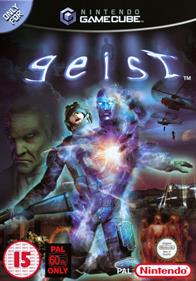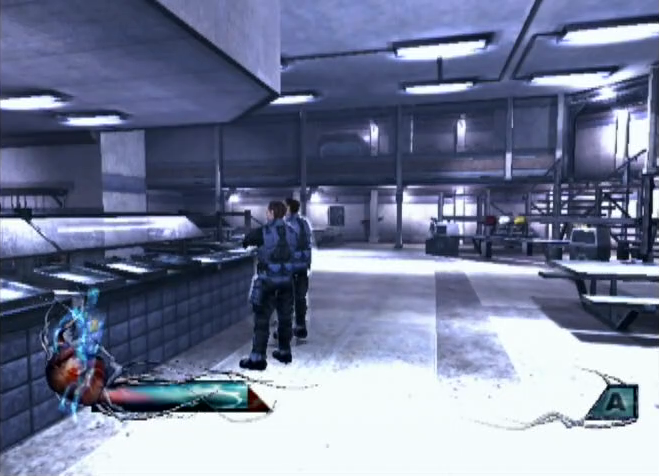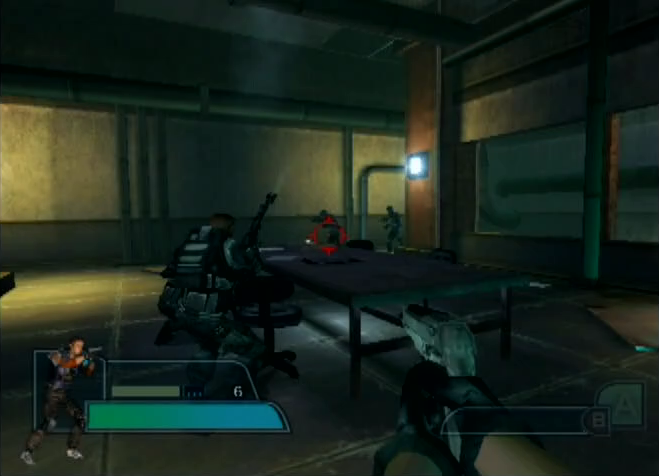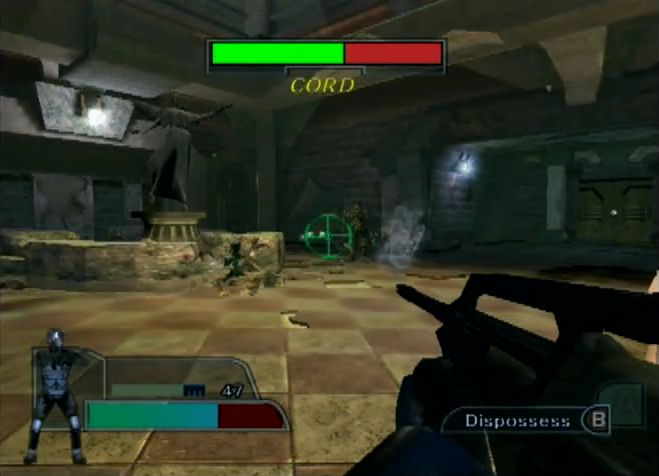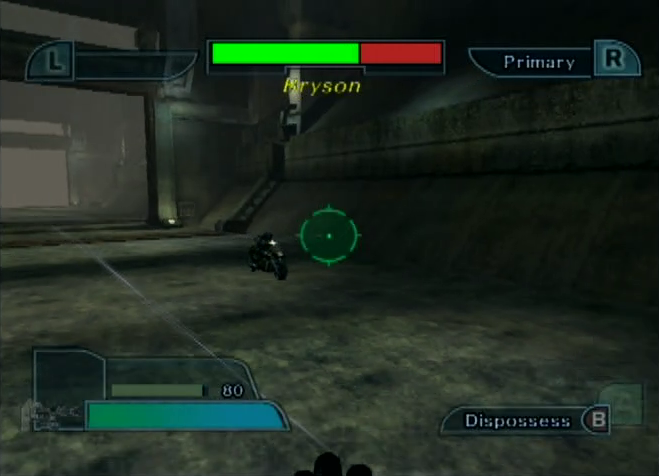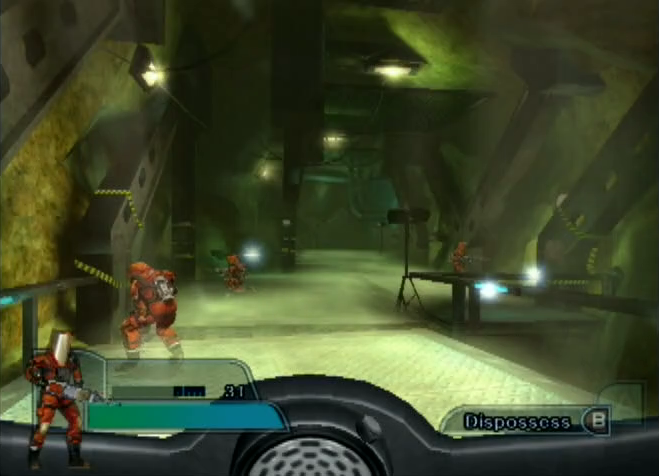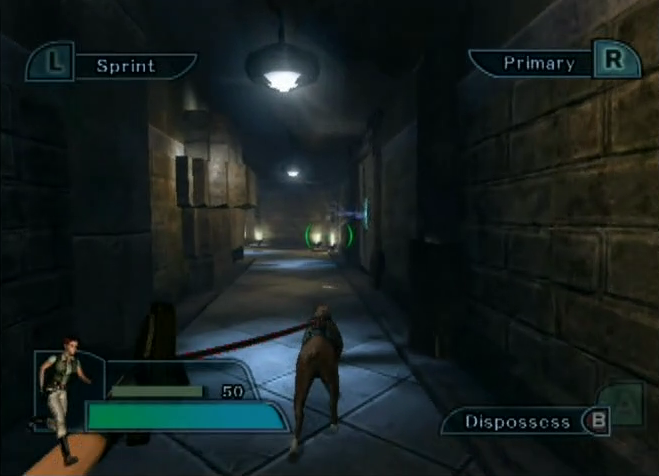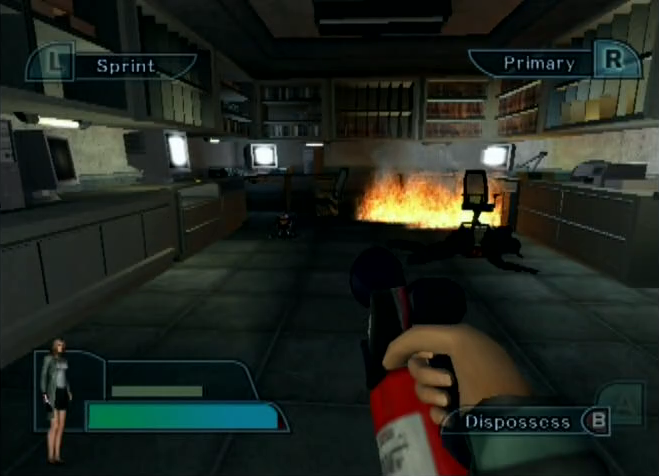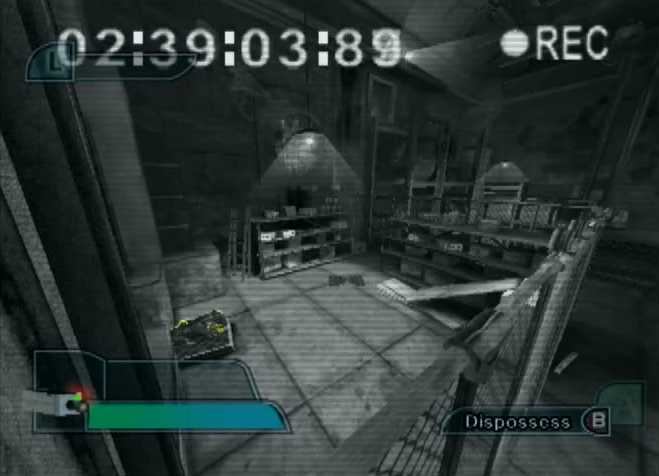GEIST (GC)
Games are very often described as ‘hidden gems’, but it’s normally an exaggeration. The tag doesn’t fit games that were once popular but have been obscured by the murky mists of time, nor those titles we see referenced on social media alongside regular claims they were underrated, underappreciated, or both. Symphony of the Night, Okami and Radiant Silvergun are all textbook examples of gems that deserved to sell better. However, to claim they were undiscovered, even in the context of their original releases, would be a stretch.
Geist is different. Fittingly enough given its ghostly moniker, mentions of this GameCube exclusive are little more than apparitions themselves, tricks of the eye. The fact it was a mature-rated FPS published by Nintendo should alone have made it conspicuous, yet it never factors in the usual conversations for a digital re-release or remaster. The press was largely indifferent to it back in 2005 and so too were gamers at retail. Despite all this, Geist is a uniquely imaginative and impressive FPS.
There are pros and cons to the spirit life: opening doors is a pain, but at least you won't end up getting shot
It’s a surprising work of quality for a development house whose back catalogue had been less than stellar. Before Geist, n-Space created (among others) a pair of lukewarm Rugrats titles, Danger Girl and Duke Nukem: Land of the Babes on the PlayStation. In the years that followed, they would concentrate mainly on DS versions of Call of Duty and the James Bond licenses, which were received with little fanfare. Geist represents an inexplicable burst of quality in the midst of these, even if it appears fairly generic to begin with. John Raimi, a scientist-cum-soldier, takes part in a raid on a laboratory. It’s only when he and most of his team are killed at the end of the prologue, that things start to get interesting.
Raimi’s body ends up being housed by the evil Alexander Volks, whose purpose is to build an army of spirit soldiers. Raimi is soon freed from corporeal constraint by a mysterious ghost child named Gigi, leaving him able to float around in spirit form, with time around him slowing to crawl. The problem is, without a host, his influence on the physical world is limited. Possessing someone requires that you scare nearby characters, normally by inhabiting and manipulating items within the immediate surroundings.
Raimi’s body ends up being housed by the evil Alexander Volks, whose purpose is to build an army of spirit soldiers. Raimi is soon freed from corporeal constraint by a mysterious ghost child named Gigi, leaving him able to float around in spirit form, with time around him slowing to crawl. The problem is, without a host, his influence on the physical world is limited. Possessing someone requires that you scare nearby characters, normally by inhabiting and manipulating items within the immediate surroundings.
FOCAL POINT: BOSSING IT
Geist knows how to conjure a good boss fight. In one instance, a giant, armoured critter barrels around a mine shaft and must be brought down through Raimi’s spirit detonating explosives at the appropriate moment. There’s a wholly unique car chase, where the player must protect a motorbike-riding ally from pursuers. Perhaps the neatest boss (at least in terms of gameplay mechanics) is the first: Cord. At first glance, he’s a fairly straightforward opponent, who is best tackled by circling a central statue to cover from his rapid-fire weapon. Now and then, he’ll throw a grenade and, if timed right, Raimi can leave his host and jump into the grenade, rolling it straight back to its owner’s feet. It’s fantastically satisfying.
The spirit sections are a great deal of fun, with all manner of poltergeist mischief to be wrought. Sometimes, the solution is simple, like exploding a lightbulb, firing cans from a vending machine, or whipping the contents of a bin into a mini whirlwind. Often though, you’ll have to connect a number of ideas to set up a fright and in this regard, coordinating a distraction is equally important. To scare the chef in the Mess Hall, Raimi must first use an oven to burn the food, before manoeuvring a fan to direct the resulting smoke in the cook’s direction. Once you have his attention, you can delight in utilising a plate rack to catapult crockery in his direction.
Once a body has been possessed, Geist reverts to a more conventional FPS feel, albeit with a few variances dependent on the character in question. Soldiers, for example, carry firearms and can either sprint or crouch. You can also jump into scientists, janitors, secretaries and even a dog trainer. These result in different dialogues and responses when talking to those in the base and also offer varying degrees of authority. It isn’t even limited to humans, as Raimi can take control of a parrot, bats and dogs. Rats are perhaps the most novel, as they can move through tiny tunnels in the walls, allowing for access to new areas.
Once a body has been possessed, Geist reverts to a more conventional FPS feel, albeit with a few variances dependent on the character in question. Soldiers, for example, carry firearms and can either sprint or crouch. You can also jump into scientists, janitors, secretaries and even a dog trainer. These result in different dialogues and responses when talking to those in the base and also offer varying degrees of authority. It isn’t even limited to humans, as Raimi can take control of a parrot, bats and dogs. Rats are perhaps the most novel, as they can move through tiny tunnels in the walls, allowing for access to new areas.
As if all this wasn’t enough, Geist uses its unusual modus operandi to establish some fiendish puzzles, requiring your spirit form to inhabit and rotate statues or activate devices. The hack that most impressed me was gaining a door code by jumping into a keypad, setting it off and noting from inside the panel the combination entered by a nearby guard as he shuts off the alarm. The lengths the game goes to realise its spirit possession concept is extraordinary.
Combat is Geist’s main sticking point. Whilst by no means disastrous, it still leaves plenty to be desired. A common problem with console first-person shooters of the time, bullets seem to have little effect on enemies until you are up close, which forces you into unavoidably damaging scenarios. This is especially strange as there’s a sniper training section in the mid-part of the game where collision detection over long distances seems very good. There’s a decent mix of weapons, but a few sequences get a bit hairy because enemies can very quickly get a bead on you. The aiming controls could also have been more precise and more responsive. Even with deathmatch modes, it’s fair to say the likes of Halo and TimeSplitters aren’t going to lose any sleep.
Combat is Geist’s main sticking point. Whilst by no means disastrous, it still leaves plenty to be desired. A common problem with console first-person shooters of the time, bullets seem to have little effect on enemies until you are up close, which forces you into unavoidably damaging scenarios. This is especially strange as there’s a sniper training section in the mid-part of the game where collision detection over long distances seems very good. There’s a decent mix of weapons, but a few sequences get a bit hairy because enemies can very quickly get a bead on you. The aiming controls could also have been more precise and more responsive. Even with deathmatch modes, it’s fair to say the likes of Halo and TimeSplitters aren’t going to lose any sleep.
Guns aren't the only tools at your disposal in Geist
Surprisingly for an FPS, however, this doesn’t really spoil things. Frustrating as the shooting bits sometimes are, they tend to arrive in short, action-packed bursts, with the reward for progression being a new section of the base to explore as a spiritual fly on the wall. The change of pace is always welcome, as you seek to discover which of the personnel offers the best chance of gaining access to restricted areas.
It will have you hooked because it’s never obvious what form the next challenge will take. Geist’s music is suspenseful, an ideal fit for a game that isn’t scary per se, but tense and gripping. Locations and objects impress with their attention to detail and despite the complications that likely arose from the player detatching from their host mid-firefight, it has a pleasingly solid feel with few graphical aberrations or bugs. Character models are really good, if a little lacking on the animation side. Dialogue is par for the course for 2005: it does the job, though the delivery often sounds a little disinterested.
Geist is a lengthy, compelling affair that’s quite unlike any other first-person shooter you’ll have played. Spikes in the difficulty (the odd boss fight can be brutal) and mediocre combat sequences diminish only marginally what is a triumph of originality and smart design. A marvellous GameCube curio and one deserving of more attention.
It will have you hooked because it’s never obvious what form the next challenge will take. Geist’s music is suspenseful, an ideal fit for a game that isn’t scary per se, but tense and gripping. Locations and objects impress with their attention to detail and despite the complications that likely arose from the player detatching from their host mid-firefight, it has a pleasingly solid feel with few graphical aberrations or bugs. Character models are really good, if a little lacking on the animation side. Dialogue is par for the course for 2005: it does the job, though the delivery often sounds a little disinterested.
Geist is a lengthy, compelling affair that’s quite unlike any other first-person shooter you’ll have played. Spikes in the difficulty (the odd boss fight can be brutal) and mediocre combat sequences diminish only marginally what is a triumph of originality and smart design. A marvellous GameCube curio and one deserving of more attention.
|
|
VERDICT
"Spikes in the difficulty and mediocre combat sequences diminish only marginally what is a triumph of originality and smart design. A marvellous GameCube curio and one deserving of more attention." OVERALL: 8/10 |
